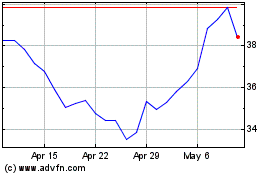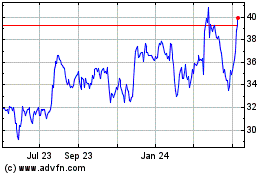By Andrew Ackerman and Patrick O'Connor
WASHINGTON -- American mutual funds estimate they spend more
than $300 million every year chewing up 2 million trees to print
and send investors 440 million densely written reports -- which
many recipients promptly toss out unread.
"If they were to come on days the trash cans were out, I
wouldn't even bring them inside the house," said Ben Perlman, 35,
an employee at Emory University in Atlanta, who invests in four
mutual funds with his wife and receives eight such reports in the
mail each year.
So last year, regulators proposed what to them was an obvious
adaptation to the age of Venmo, bitcoin and mobile banking: make it
easier for funds to provide certain records electronically.
But what was logical progress to some loomed as a menace to
others -- notably the American Forest & Paper Association and
the Envelope Manufacturers Association. The two industries' jointly
funded group Consumers for Paper Options rallied retiree and
consumer groups to join their campaign, decrying what they call the
government's "rush to digitize." They persuaded a bipartisan
coalition of politicians -- especially from the paper-heavy state
of Maine -- to threaten legislation blocking the rule.
They prevailed, beating back the forces of the 21st century, at
least for a few more years. At a mid-July public hearing on the
issue, Mary Jo White, the chairman of the Securities and Exchange
Commission, noted the proposal had drawn "considerable attention."
She ultimately decided to drop the plan, according to people
familiar with the matter. A formal announcement is planned this
fall.
"Millions of our fellow Americans will be left out in an
information desert," Rep. Bruce Poliquin, a Maine Republican
leading the pro-paper faction, warned on the House floor July 6,
should regulators curtail the mass dissemination of 1,000-page
semiannual and annual reports detailing things like "Affiliated
Broker Transactions" and "Basis for Approval of Investment Advisory
Contracts."
Republican Susan Collins, the senior senator from the Pine Tree
State, earlier this month issued a statement warning of "confusion
and potential financial discord among the Americans who receive
these financial disclosures."
Yet receipt of such disclosures can also foment confusion and
discord.
Lee McGowan, a Concord, Mass., investment adviser, has to prod
his customers to open the reports. "So many clients ask, 'What do I
do with this?'" he said.
As part of the research justifying the rule change, the SEC
highlighted a 2011 survey in which 59.5% of respondents said they
would look at their mutual fund's annual report on its website,
compared with 24.5% who said they would request a mailed hard
copy.
It is easy to see why the average retail investor may choose not
to delve into the thick documents stuffing their mailboxes. In
February, AXA Equitable Life Insurance Co. sent out thousands of
copies of a 1,463-page 2015 annual report (six months after mailing
its 1,337-page semiannual report), including the requisite details
of dozens of various combinations of investment products.
Mutual funds have sought to cut back the mailings to save costs.
The SEC included a provision making it easier to do so in a broader
package of rules requiring more industry disclosure. The paper part
seemed modest, since current rules already allow funds to transmit
reports electronically, and 43% of investors currently opt for that
instead of paper reports, according to Broadridge Financial
Solutions Inc., which distributes fund reports.
Under the SEC's plan, investors would still have the option of
receiving paper versions, but the default choice would have flipped
from paper to electronic. Investors who don't indicate a preference
still would get a mailed notice every time a fund posts a new
report online. Specifically, the SEC envisioned applying the switch
to annual and semiannual reports, which detail fund performance,
fees and asset holdings amid a sea of legalese.
But that flip was enough to rile up the forces of paper and
envelope makers fighting the forces of digitization. Consumers for
Paper Options got its start in 2010 battling banks charging fees to
customers who chose to receive paper statements. In 2014, the group
quashed an attempt by the Social Security Administration to scrap
paper statements that calculate workers' expected retirement
benefits. They are now pushing legislation to force the Internal
Revenue Service to resume mailing out 100-page tax-preparation
guides it largely stopped sending in 2011.
During a public-comment period that began last summer, the SEC's
package of mutual-fund regulation changes generated more than 1,000
online responses. These included: A Kentucky Democratic congressman
worried about harm to a commercial printer in his district; 12 from
people identifying themselves as letter carriers; and 35 from
employees and executives of Glatfelter, a York, Pa., maker of
specialty papers. "Paper records of my personal investments have
survived the crashing of hard drives," wrote one of the company's
senior product managers.
Luann Waddell, an investor and retired letter carrier from Mesa,
Ariz., wrote: "I am deeply concerned about the security of the
internet," citing recent government hacking cases.
"We still need to have a right to have something to read off of
a computer screen," wrote Kimberly Bennett, who didn't identify her
affiliation or location. "DO NOT TAKE THIS RIGHT AWAY FROM
PEOPLE!"
As often happens in such Washington scrapes, the rhetoric turned
overheated and high-minded. The pro-paper faction portrayed itself
as the protector of the aging and indigent most vulnerable to being
left behind in the technological rush.
"It's easy to think the world has gone digital," said John
Runyan, a former lobbyist for International Paper Co. who now runs
Consumers for Paper Options. "The trend lines are in that
direction, but why do we want to disadvantage the people who are
least likely to manage that transition?"
Mutual funds depicted themselves as progressives countering
Luddites, and as ardent environmentalists. Paper mailings are a
vestige of "a bygone era" when people used to go to stores to rent
VHS tapes, David Blass, general counsel for the Investment Company
Institute, an industry group, said in a March speech. "Count all
the harmful compounds emitted during paper manufacturing -- along
with the massive amounts of waste that discarded paper produces,"
he said, "and we're absolutely crushing the environment here."
In the end, big paper scissored big mutual funds. The SEC has
decided that when it finalizes the broader package of industry
disclosure rules in October, the digital default will end up on the
cutting-room floor.
(END) Dow Jones Newswires
August 24, 2016 15:04 ET (19:04 GMT)
Copyright (c) 2016 Dow Jones & Company, Inc.
International Paper (NYSE:IP)
Historical Stock Chart
From Mar 2024 to Apr 2024

International Paper (NYSE:IP)
Historical Stock Chart
From Apr 2023 to Apr 2024
